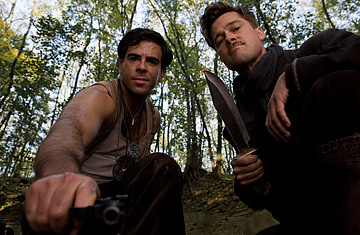
Lt. Aldo Raine (Brad Pitt) and Sgt. Donny Donowitz (Eli Roth) in Quentin Tarantino's Inglourious Basterds.
(2 of 2)
Laurent, Kruger and Waltz (who earned the Best Actor award at Cannes in May) are the soul of the film. Their conversations percolate with menace because Tarantino plants plot elements that blossom later for maximum impact. When Colonel Landa asks one of the ladies for her shoe and, at a restaurant, orders milk for the other, you feel nooses tightening around their necks and yours. In these scenes and another in a basement bar where the smallest wrong gesture cues a bloodbath, Tarantino shows how to achieve drama through whispers and forced smiles. The parallel plot of a budding romance between Shosanna and a German war hero (Daniel Brühl) has a similar trajectory--the pot simmers, then the lid blows off--and the same artful mix of subtlety and surprise. These vignettes work much better than the big set pieces, with the Nazis in the movie theater or the Basterds in the field. You needn't scalp a man to make his hair stand on end.
It's just possible that Tarantino, having played a trick on history, is also fooling his fans. They think they're in for a Hollywood-style war movie starring Brad Pitt. What they're really getting is the cagiest, craziest, grandest European film of the year.
